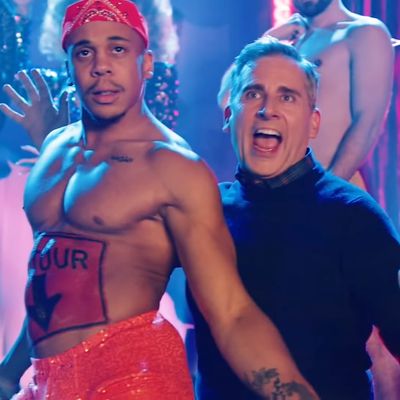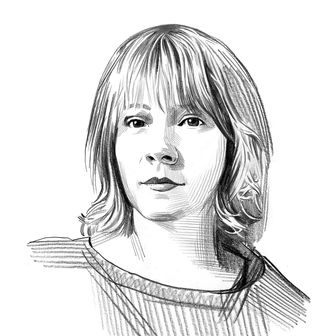
Society has come a long way when even Saturday Night Live can admit that being straight is boring. For decades, the show rested on the unshaking belief that nothing could be funnier or more compelling than a straight, slovenly man. But ever since RuPaul’s Drag Race, drag culture has been infiltrating the mainstream. Even corporate entity Twitters are throwing shade and making Mean Girls jokes, so you know something has changed. Queerness is something to co-opt, not just murder. And that counts as progress.
On last weekend’s SNL hosted by Steve Carell, “GP Yass” was a sketch that highlighted the commodification of gay POC culture for straight white audiences without making anyone feel too bad about their place in that ecosystem. Queerness is a party, and everyone is invited! Writers James Anderson and Bowen Yang talked to Vulture about how the sketch came to be, how gay jokes change when gay people are writing them, and what it’s like to break new ground on such an established show.
So I know that the writers of a sketch have a hand in producing, choosing props and whatnot. Does that extend to casting go-go dancers?
Anderson: No, that was a surprise. I mean, we put dancers in there, but wow.
Yang: James wrote them in. James wrote the whole sketch. I got added on to assist. When the dancers came on set, it was a moment for everyone.
Anderson: It was really like “Wow! The talent is here.” It was unreal.
Yang: We were really marveling at what they could do.
Anderson: It was like they were acrobats.
Tell me about how this sketch came together. James, this was your idea first?
Anderson: Yeah. This sketch has been in my computer for a while, and it just never got put into the pack. First of all, I am a big fan of RuPaul’s Drag Race. My friend in college was a drag queen, and I’ve always marveled at the language. It’s so funny to me. And I just thought it would be pretty fabulous to have something as mundane as GPS be given to you with a little bit of shade. A little bit of finesse.
Bowen, how did you come to work on this sketch?
Yang: Normally what they do with the first-year writers is that they will attach them onto someone else’s piece that gets picked for the show. “GP Yass” killed at table, and of course it got picked for the show. And I think James had a hand in bringing me on. I immediately texted him, “I can’t believe I get to work on this with you.”
Anderson: He added so much though, so much polish on the nails. A lot of the times, you come up with lines on the fly when you’re filming. I couldn’t think of a better person to be there, throwing out lines, than Bowen. Also, your energy, baby!
Yang: Oh my God. It was great because we had these two new directors, Adriana Robles and Hannah Levy. All four of us are huge fans of Drag Race, and the culture. It was great for all four of us to bat around ideas on set. It was fantastic.
The two queens were from Drag Race, right?
Anderson: Peppermint and Jiggly Caliente.
And there were three other personalities on the GP Yass – did you come up with those names?
Anderson: Those were not real. Or if they are, I want to meet them.
Yang: Those were James and Bowen originals.
Anderson: Candy Travesty, D’Clined, and Unita Triscuit.
What do you think goes into a good drag name?
Anderson: I like [names like] Monet X Change. I like the ones that have kind of a little pun to it. But they’ve got to be fierce too. Candy Travesty, I don’t know why that hit my ear. It’s not really candy that’s a travesty.
Candy Travesty sounds like the daughter of, like, Issa Travesty. From the House of Travesty.
Yang: I think James really nailed it – that drag names run the gamut from clever pun to some Warholian names. Or like a really basic element.
Anderson: Like Aquaria.
Yang: Yes, like Aquaria.
What does Lorne Michaels know of drag culture?
Anderson: Well, he’s learning!
Yang: I think probably, when RuPaul won the Emmy, that registered to him. That this was something that has broken through and mainstreamed in some fashion now. I think he’s starting to get it. He watched it with us, and I think he might have been confused at points. I don’t know, James. What do you think?
Anderson: He’s growing. But in the ‘70s, there had to have been a couple ‘70s drag queens out there. It is more mainstream now than it’s ever been.
Well, let’s talk about that. Drag queens are succeeding where respectability politics failed, in terms of mainstreaming the existence of gay people. I feel like the sketch spoke to that. What do you think of that phenomenon?
Anderson: I’m just loving that it’s more mainstream.
Yang: You have people like James, or like Paula Pell, like Julio [Torres], who have really been able to package [queerness] in a way that is palatable to everybody. Lorne just wants to make sure that everyone is on the same page about whatever’s being shown. The show has built that over time.
It’s a big deal to have Peppermint and Jiggly, two trans women, be on a pre-taped sketch for Saturday Night Live. I think she even posted on her Instagram that, at least to her knowledge, there hadn’t been any other transgender women on the show. Maybe ever. I think with what we’re putting out there now, that ground is sort of being broken. It just takes the right package to have that come through.
Something that Drag Race has done, and this sketch by extension, is put queer horniness on display in a way it hasn’t been in comedy before – in that it isn’t the joke, and it isn’t a threat.
Anderson: Right. I love that. I love that it’s not like that anymore. I’ve worked at Saturday Night Live for twenty years, and I’ve seen comedy change. It’s a beautiful thing. I love it.
How were things, generally in comedy, not beautiful before?
Anderson: They were, actually. It’s just interesting to see how it changes. I wrote “Gays in Space” with Fred Armisen. I do feel like that was a respectful thing, but I do feel like it’s become more of a thing to present gay culture, drag culture, the whole LGBTQ universe, as just a part of life. It’s not the joke of the piece.
Yang: The first time I met James, I brought up “Gays in Space” as this very seminal and influential thing for me – watching SNL at home as a young queer person, the impact that had on me. James never wrote anything with a gay panic attached to it. And I think what you’re saying is right, there’s no threatening element to it. James made sure to write Steve Carell’s character as someone who’s like “I’m loving this, I’m enjoying it! This is fun!” It’s something that everyone can get on board with.
Anderson: Or even just putting gay characters in a sketch, but not having to call out that they’re gay. It’s just two guys together at a party, but the whole sketch doesn’t have to pivot on that. They’re at the party with everybody else.
Yang: Or it’s just go-go boys on a GPS screen, and that’s not the main comedic centerpiece of the sketch. They’re an embellishment. I think that’s a fun, new place we’re at in comedy.
Drag Race has generated a lot of discussion about appropriation and how drag culture is being appropriated by the straights. “GP Yass” is a product that speaks to that appropriation. Does that ever worry you, that loss of distinctiveness?
Anderson: I don’t know. I have two thoughts on this. It’s sort of like having the gayborhood, but also having it gentrified. When you go to Provincetown, it’s children, it’s families, it’s gay people, it’s drag queens. It’s amazing! I love that. I absolutely love that everybody can mix together. But then there was something about the gayborhood I liked, too – when you knew where you were going. But I think that’s because I’m an old fart. I don’t know. What do you think, Bowen?
Yang: I think your thing about Provincetown is right on. When I go to Fire Island, it’s always sort of the same thing. Everyone is coexisting, and isn’t that nice? But also, the risk of people co-opting what is a queer invention is … okay, as long as it’s not for capital. As long as everyone is doing it with the right intention, as long as it’s not causing any harm or taking away an opportunity from someone, then I think it’s okay. We had these queer queens, these mostly queer go-go boys, and Cecily who is a queer-canonized sketch comedian. I think it’s fun, for now, that we were able to put this out on a mostly hetero space like SNL. For now, I think the risk is just an opportunity. It’s a testing ground, for now. And hopefully we can adjust and have it be a Provincetown situation where everyone is coexisting nicely.


